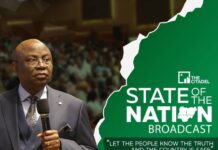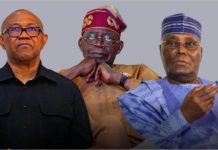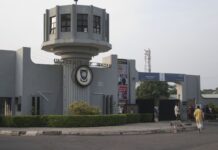Rotimi Fasan
The Northern political elite likes to have its cake and eat it. As part of its grouse against the APC-led government of Bola Ahmed Tinubu, it demands an end to insecurity in the North while it makes a lasting solution to the problem impossible. They obviously need a reminder that they can’t have it both ways. Beyond not having things both ways, they must also know they cannot place on others a problem they not only created but one they had every opportunity in the world to end but turned their backs on.
It was their policy of wielding power without responsibility, overseeing the mass immiseration of their own people while sitting over the nation’s commonwealth which they stash away for personal comfort and use, that resulted in the banditry, insurgency and kidnappings that are today the hallmarks of life across most parts of the far North and many parts of the North- Central states of Niger, Benue, Plateau, Kwara, Nassarawa and others they’ve exported their home-grown problems to.
Since the latest cycle of carnage- mass murders, abductions and the summary sacking of communities by marauding groups of terrorists who rape women and girls, slaughter children and their parents and chase them away from the ancestral lands they proceed to occupy in blatant acts of genocide and land grabbing, the self-serving mouthpieces of the Northern poor have had nothing to say beyond wagging their fingers at others to whom they’ve shifted both the responsibility and blame for their failure of criminal negligence. It was only weeks ago that they turned out in sackcloth and ashes wailing loudly over the murders of 16 people identified as hunters but who the locals in Uromi who apprehended them said were kidnappers, part of the criminal elements that had snatched peace from that part of the country.
But today they are tin-eared, deaf to the cries of many that have been turned orphans, widows and widowers in the orgy of mass killings perpetrated by foreign elements that are mainly of the same Fulani ethnicity as the majority of the Northern elite now up in arms against Abuja today. Let us face it, the elite figures singing the song of marginalisation and in the vanguard of those demanding the return of power to the North, less than two years after Muhammadu Buhari’s two-term, eight-year presidency, are essentially Fulani. They are the minority rulers of the North and, indeed, Nigeria that speak in the name of the majority of us, especially the Hausa whose language they adopted and made the regional lingua franca to camouflage the sleight of hand that has turned the aboriginal Hausa into strangers in their own land.
Despite decades of steering the levers of power, whether in khaki or babariga, there is little they have to show for it in terms of how the poor majority in whose name they have held the entire country in thrall have fared. Poverty that has led to the rise of armies of multidimensionally poor people is the most visible bequest of this tiny group of ruling parasites that have mastered the finger-pointing game of blaming outsiders for their peculiar ailment of manufacturing poverty, a product they routinely weaponise to blackmail their counterparts from other parts of Nigeria.
Is it any wonder that the three brands of poverty-induced insecurity in the North have been configured around ethnicity and the migrant Fulani from far-flung parts of Africa. Imported, allegedly, for purposes of electoral malfeasance, they specialise in a mix of banditry/kidnapping and ethnic cleansing while the Kanuri take the cake in insurgency. All three brands of terror are euphemised under the broad label of farmers (meaning Hausa) and herders (that is Fulani) clash, even in the communities of the North-Central, theatres of mass killings, that manifest every imprint of genocide.
The Fulani political elite, the embodiment of Northern anxiety, have had little else to offer beyond blaming the president, accusing him of fiddling while Nigeria burns. They obsess about the presidency and the office of the president as if that is the only relevant factor in the problem confronting Nigeria. They blab about the president’s travels in pursuit of private ends (certainly not a thing to excuse) as if this only started today. Where were they when Buhari made the United Kingdom his home? They rail against inflation, the removal of the subsidy on oil and demand an end to corruption as if the Fulani-led government of Buhari they helped midwifed and served in one capacity or another showed no symptoms of these ailments.
Thus, the likes of Usman Yusuf, Sheik Ahmad Gumi, Nasir el-Rufai, Usman Bugaje and lately, Hakeem Baba-Ahmed, feel entitled with their lamentation about the condition of mass poverty, perceived marginalisation and neglect of the North and threaten dire consequences against today’s office holders. They could, as is the case with Hakeem Baba-Ahmed, even leave hints of the North (is it the North of the Fulani, Birom or Bachama?) seceding. Baba-Ahmed who left the Tinubu administration as a Special Adviser to the President on Political Affairs in the office of the Vice President, spent about a year in Aso Villa before throwing in the towel in apparent protest against being reduced to desk-bound sinecure roles of a time-server drawing pay without working.
The most frustrating part of his sojourn in power, according to him, was his inability to effect any change in policy despite his proximity to the president who he only saw on three occasions in the Villa’s Mosque. The president, he says, leads an insular existence. He also complained of the quality of subordinates that surrounded him, attributing his feckless adventure in power to the rigid structure (one probably with origin in military rule) of the presidency, especially the office of the president and the vice president. In the end, he felt both stymied and underutilised, prompting his decision to leave. He achieved nothing he set out to achieve.
The irony of Baba-Ahmed’s frustration is that he fails to understand that it is this failure of structure that is at the root of Nigeria’s problems of insecurity. For as long as the structure remains unchanged to that extent will Nigeria’s problems remain no matter the person in charge. Had the North not failed to support the idea of a police system run by the states, we’ll probably be telling a different story about insecurity and fiscal discipline today. With virtually all 36 states now supporting the idea after decades of opposition from the North, we are yet to scale the last hurdle. Will the North, misconceived as one by the Fulani elite, ever learn this simple wisdom of Nigeria’s history of state failure: that structure or institution more than people makes all the difference?




























































